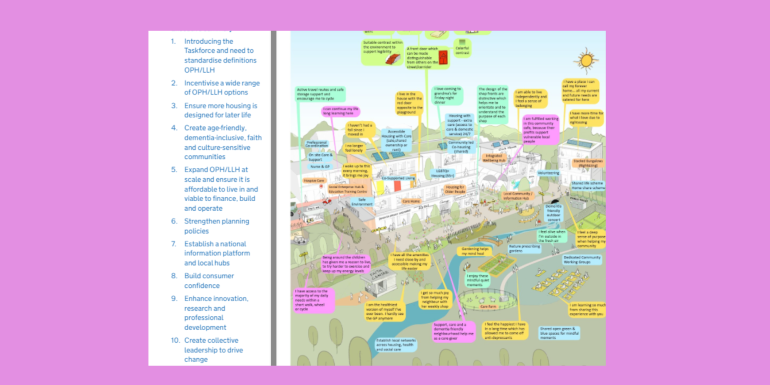- Only a tenth of housing-with-care planning consents get delivered
- Calls for planning system to be reformed to reduce waste and inefficiency
- Sharp distinction in build out rates between specialist providers and speculative applications
89% of successful planning applications for older people’s housing-with-care since 2015 have not been built, resulting in huge waste and inefficiency. This is aggravating the UK’s already dire shortage of specialist housing options according to new research published today by ARCO (Associated Retirement Community Operators) and consultancy Carterwood.
The findings, revealed in the ‘Planning, Clarity and Certainty’ publication, highlight a huge gulf in older people’s housing delivery rates. Looking at 2015 only, specialist providers of all forms of housing for older people tended to build out the vast majority of consented sites (93%). By contrast, only 28% of consents by non-specialist providers were delivered. The report says this is due to the speculative nature of many applications by non-specialist developers, and the fact that many applications are made without any intention of the scheme being built.
This has prompted sector leaders to call for clearer and tougher planning rules for different types of older people’s housing, doing more to reduce wasteful speculative applications and ensure that successful applications are built, and providing greater clarity on the different types of older people’s housing – for instance through a new planning use class for housing-with-care to differentiate it from traditional retirement housing and care homes.
The ‘Planning, Clarity and Certainty’ document points to a number of key barriers currently frustrating the development of older people’s housing, including housing-with-care. These are:
- Lack of knowledge about housing-with-care among planning authorities: planning officers are often unaware of the key differences between care homes, housing-with-care and traditional retirement housing.
- Lack of a clear treatment and definition in the planning system: there is a lack of consistency in approach when it comes to agreeing the planning use class for housing-with-care, often having a material impact on viability and/or slowing down the process of gaining planning consent.
- Lack of a shared understanding of need: there is no accepted figure representing the level of need for housing with care, with some sources vastly underplaying need.
- Lack of resources: the lack of resources in planning departments is making the timely progression of planning applications difficult, despite planning officers’ best efforts.
In the document, ARCO and Carterwood say that greater clarity is needed in the planning system, whether through the creation of a new planning use class for housing-with-care or clarifying how it should be developed through existing use classes. They also argue that a shared understanding of need should be built, so the number of required units can be predicted at the local level.
‘Planning, Clarity and Certainty’ has been published following a roundtable hosted by Carterwood in February 2020, to discuss barriers and solutions to planning in the housing-with-care sector, and builds on in-depth data collection and analysis by Carterwood.
Michael Voges, Executive Director of ARCO, said:
“The low levels of development of older people’s housing highlighted by the research is very concerning at a time when the coronavirus pandemic has shown the need for far more housing and care for older people.
“The planning system is clearly not delivering the type of specialist housing for older people that we so desperately need. There is an urgent need to respond with clear and tougher planning rules – no one needs consents that don’t get built out. More needs to be done to recognise the distinctions between housing-with-care, retirement housing and care homes. A new planning use class for housing-with-care is an option that needs serious consideration.
“I’m very grateful to Carterwood for their expert contributions to this publication, which has underlined both the barriers to good housing for older people in this country, and some clear steps we can take to make radical improvements.”
Tom Hartley, Director of Carterwood, said:
“The last three months have brought unprecedented challenges to the health, social care and housing sectors, but also some fantastic stories of housing-with-care settings keeping their residents safe and continuing to promote their wellbeing.
“We would like to thank ARCO and its members for their hard work during this time, and for allowing these benefits brought by housing-with-care to shine through.
“Our data shines a light on a significant structural problem in the planning system, which it is essential we address if we’re going to unlock the future supply of much needed housing-with-care accommodation, so that hundreds of thousands more older people can benefit from the care and support it provides.”
The full report can be accessed here.
For Further Information Please Contact
Sam Dalton, Policy & External Affairs Executive, at samdalton@arcouk.org or on 07722553856
Notes to Editors
1. About ARCO: ARCO (the Associated Retirement Community Operators) is the trade association for operators of housing-with-care developments for older people. ARCO was founded in 2012, and is now comprised of 27 private and not-for-profit operators of housing-with-care. ARCO represents approximately 50% of the housing-with-care sector. ARCO sets high standards, and all ARCO members must adhere to the externally assessed ARCO Consumer Code. ARCO does not represent the traditional retirement housing model where there are limited services and no care is available or care homes.
2. About Carterwood: Carterwood is a multi-award-winning property consultancy dedicated to social care. Their team of specialists provide independent, expert analysis that helps operators, developers and investors to improve decision-making within the retirement community and elderly care home sectors. Carterwood are one of the few dedicated practices that are regulated by the RICS, and they work with and support several industry partners to share knowledge and forge new relationships. In addition to ARCO, these include Care England, the National Care Forum and Housing LIN.
3. About housing-with-care: Housing-with-care typically consists of individual one or two bedroom flats or houses, located in a development with similar properties. Residents have access to a range of services and facilities, which will include optional on-site care, 24-hour staffing, and dining and leisure facilities, and may also include bars, gyms and craft rooms. Housing-with-care settings are also sometimes referred to as Retirement Communities, retirement villages, extra care housing, assisted living, or close care apartments. They sit in between traditional retirement houses (which have less extensive staffing and leisure facilities), and care homes, and can be in urban or suburban locations.





